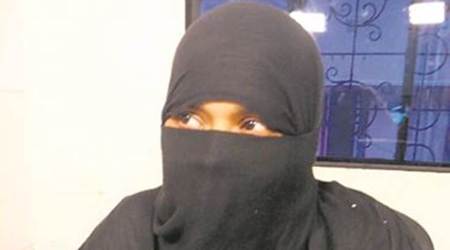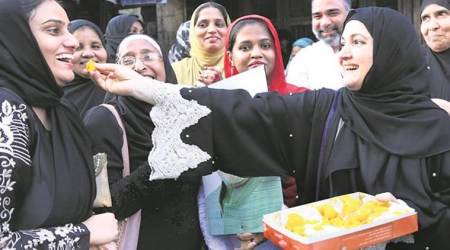 From women fighting cases against husbands to recent victims left in the lurch, they clutched at hope, cheered “a historic day for Muslim women” and questioned the uncertainty the judgment had left in its wake.
From women fighting cases against husbands to recent victims left in the lurch, they clutched at hope, cheered “a historic day for Muslim women” and questioned the uncertainty the judgment had left in its wake.
THE FIRST question that Shazia Fatima, 26, asked the inspector at the Women’s Police Station at Central Crime Station in Hyderabad as she walked in at 11.30 am Tuesday was about the Supreme Court verdict on triple talaq. Inspector Madhavi Latha tried to explain but, unable to comprehend fully, Fatima asked her what happens to her complaint now.
The police station in Basheerbaug receives the highest number of complaints regarding triple talaq in the city, at least 10 a week. Most of the women say they were given talaq over the phone, in text messages or WhatsApp, by husbands in the Gulf.
In Delhi, a 28-year-old Muslim woman who has been fighting a legal battle for over three years against her husband who claimed to have given her triple talaq, said she would now move court again to get maintenance. Her husband has denied her money on the ground that since he gave her triple talaq, he wasn’t obliged to pay anything more, apart from mehar. Hours after the Supreme Court verdict striking down instant triple talaq, the reactions that poured in from across the country summed up the mood.
From women fighting cases against husbands to recent victims left in the lurch, they clutched at hope, cheered “a historic day for Muslim women” and questioned the uncertainty the judgment had left in its wake. From the daughter of the late Shah Bano, whose landmark Supreme Court victory in 1985 over maintenance was overturned by legislation, to Shayara Bano, the main petitioner in this case.
“I am for the Supreme Court judgment in the sense that it will help illiterate women who are constantly under pressure and live in the fear of being given talaq,’’ said Siddiqua Ahmed, the daughter of Shah Bano in Indore. “I hugged my family when the verdict was delivered, they congratulated me, told me it is a historic day for Muslim women in India. We have been vindicated. Not just me, for all those like me, even those that were not present, this is for all of them,” said Shayara Bano in New Delhi.
In Hyderabad, though, Fatima wasn’t convinced. “Do you think the decision today changes anything for me? If I cannot save the marriage, I want to ensure that my husband returns all the money and gifts my parents gave, and takes care of our daughter by giving some monthly allowance. I hear he is preparing to marry again,” she told Inspector Latha. Fatima was married to Javed, a cloth salesman. One day, three years into the marriage, he stopped coming home, she said. A week later, he called and said talaq thrice. She came to the Women’s Police Station a fortnight ago.
“Many talaq victims came asking today about the Supreme Court verdict. All are disappointed because it says nothing about women who became victims recently,” a counselor, A Lakshmi, said. Commenting on the high number of cases of triple talaq they receive, especially concerning husbands in the Gulf, Inspector Latha said, “They come here for two-three months, get married, spend some time with the newly wed wife and after going back, say triple talaq. In such cases, we cannot do much. In cases where the husband is in Hyderabad, we call him and try to counsel him.”
In Delhi, the 28-year-old, who has been fighting her case in Mahila Court, said the Supreme Court order has given her hope for justice, and she would now seek maintenance challenging the validity of her triple talaq. Her husband claimed to have divorced her four years ago, and appeared before the court for the first time only recently to answer charges of domestic violence and of marrying another woman without divorcing the first. Her advocate Shubra Mendiratta said, “The matter is to be heard on October 6. The man has used a single argument that he has given triple talaq and that his responsibility is over. But now we will challenge the triple talaq as it has now been held unconstitutional.”
The woman said her husband never officially gave her divorce. “He married someone else and left”, she said, soon after their newborn girl died in 2008. “Only when I sought maintenance in court (in July 2014), I came to know he had given triple talaq. No one in the family was aware of this. I welcome the Supreme Court judgment. This will now help me get justice,” she said.
The woman also told the Mahila Court she had been “physically tortured and abused” and sought legal action under the Domestic Violence Act. The man, who works as a scrap dealer in Old Delhi and earns Rs 2 lakh per month, told the court that he had given her talaq on September 29, 2013. He also claimed that he settled “the mehar amount of Rs 25,000 on the first night of the marriage”.
“As per the Muslim law, I am sending a sum of Rs 6,000 by way of separate money order for maintenance of three months of the iddat period,” the document filed by the man states. Mehar is a mandatory payment promised by the groom and his family to the bride at the time of marriage, that legally becomes her property. Iddat is the period a woman must practise abstinence after divorce, during which she may not marry another man.
Said advocate Mendirata, “His argument is that he has settled the mehar amount, and that he has given her triple talaq. However, now, since the instant triple talaq is unconstitutional, this argument does not hold. In this case, the woman should get maintenance. The Supreme Court has given justice to hundreds of women. I hope the lower court interprets this judgment the same way.”
Mendiratta, who is handling several cases of triple talaq, urged that the National Legal Services Authority play a role in securing compensation. “We welcome today’s judgement. But what happens to women whose husbands have got married to some one else? The execution of the maintenance takes years. The government should step in and ask the Legal Services Authority to give compensation to such women, only then will justice be served.”

